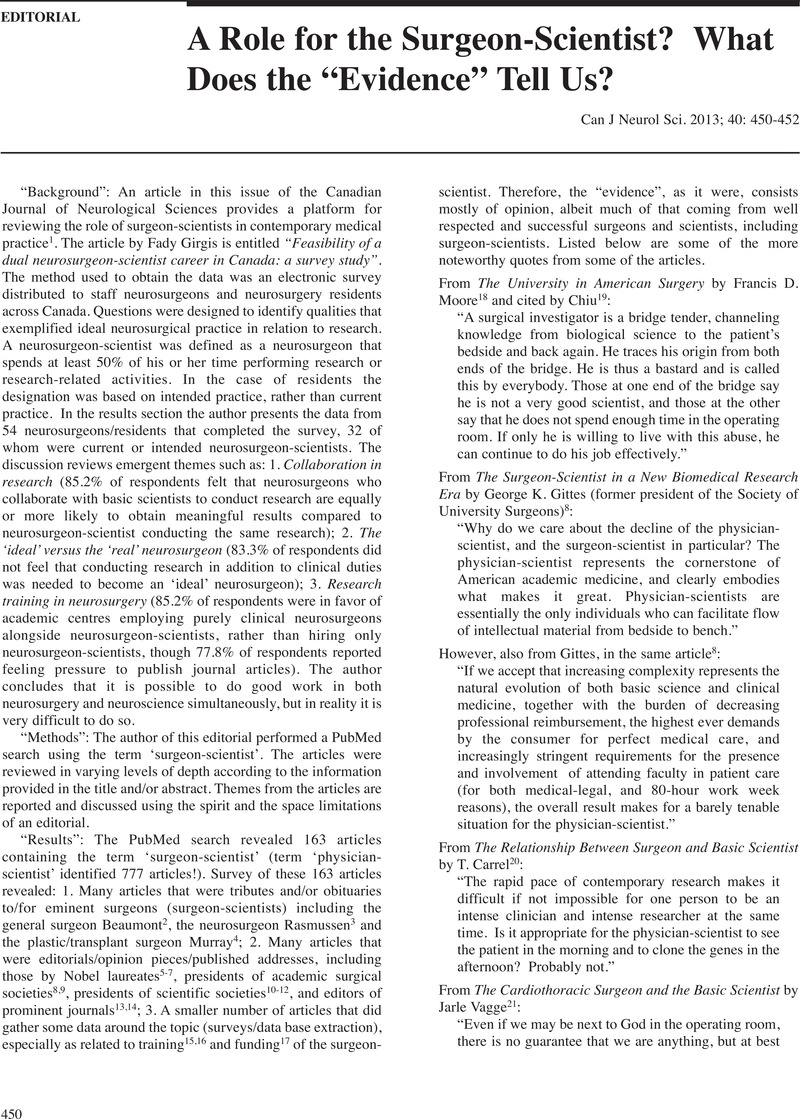No CrossRef data available.
Article contents
A Role for the Surgeon-Scientist? What Does the “Evidence” Tell Us?
Published online by Cambridge University Press: 23 September 2014
Abstract
An abstract is not available for this content so a preview has been provided. As you have access to this content, a full PDF is available via the ‘Save PDF’ action button.

- Type
- Editorial
- Information
- Copyright
- Copyright © The Canadian Journal of Neurological 2013
References
1.
Girgis, F.
Feasibility of a dual neurosurgeon-scientist career in Canada: a survey study. Can J Neurol Sci. 2013;40(4):504–11.CrossRefGoogle Scholar
2.
Toledo-Pereyra, LH.
William Beaumont: First American surgeon scientist and father of gastric physiology. J Invest Surg. 2003;16:55–6.CrossRefGoogle Scholar
3.
Feindel, W.
Theodore Brown Rasmussen (1910-2002): epilepsy surgeon, scientist, and teacher. J Neurosurg. 2003;98:631–7.Google Scholar
4.
Monaco, AP.
Joseph Edward Murray, M. D., 1919-2012: pioneering transplant and reconstructive plastic surgeon and scientist, nobel laureate, humanitarian - an appreciation. Transplantation. 2013;95:903–7.CrossRefGoogle Scholar
5.
Goldstein, JL, Brown, MS.
The clinical investigator: bewitched, bothered, and bewildered - but still beloved. J Clin Invest. 1997;99:2803–12.Google Scholar
6.
Goldstein, JL, Brown, MS.
A golden era of nobel laureates. Science. 2012;338:1033–4.CrossRefGoogle ScholarPubMed
7.
Nathan, DG, Varmus, HE.
The National Institutes of Health and Clinical Research: a progress report. Nat Med. 2000;11:1201–4.Google Scholar
8.
Gittes, GK.
The surgeon-scientist in a new biomedical research era. Surgery. 2006;140:123–31.CrossRefGoogle Scholar
10.
Wyngaarden, JB.
The clinical investigator as an endangered species. N Engl J Med. 1979;301:1254–9.Google Scholar
11.
Bloom, FE.
Science as a way of life: perplexities of a physician-scientist. Science. 2003;300:1680–5.CrossRefGoogle ScholarPubMed
13.
Gershon, D.
Improving the plight of the physician-scientist in the US. Nature. 1999;402:215–16.Google Scholar
14.
Malakoff, D.
The many ways of making academic research pay off. Science. 2013;339:750–3.Google Scholar
15.
Guelich, JM, Singer, BH, Castro, MC, Rosenberg, LE.
A gender gap in the next generation of physician-scientists: medical student interest and participation in research. J Invest Med. 2002;50:412–18.Google Scholar
16.
Ko, CY, Whang, EE, Longmire, WP Jr, McFadden, DW.
Improving the surgeon’s participation in research: is it a problem of training or priority?
J Surg Res. 2000;91:5–8.Google Scholar
17.
Ley, TJ, Rosenberg, LE.
The physician-scientist career pipeline in 2005. Build it, and they will come. JAMA. 2005;294:1343–51.Google Scholar
19.
Chiu, RCJ.
The challenge of “tending the bridge”. Ann Thorac Surg. 2008;85:1149–50.Google Scholar
20.
Carrel, T.
The relationship between surgeon and basic scientist. Transpl Immunol. 2002;9:331–7.CrossRefGoogle ScholarPubMed
21.
Vaage, J.
The cardiothoracic surgeon and the basic scientist. Eur J Cardiothorac Surg. 2004;26:237–8.Google Scholar
22.
Wan, DC, Wang, KC, Longaker, MT.
Training the contemporary surgeon-scientist. Plast Reconstr Surg. 2012;129:1023–5.Google Scholar
23.
Albright, F.
Some of the “do’s” and “do-not’s” in clinical investigation. J Clin Invest. 1994;23:921–6.Google Scholar
26.
Rosenberg, LE.
Physician-scientists - endangered and essential. Science. 1999;283:331–2.Google Scholar
27.
Rosenberg, LE.
The physician-scientist: an essential - and fragile - link in the medical research chain. J Clin Invest. 1999;103:1621–6.CrossRefGoogle ScholarPubMed
28.
Vollmar, B, Menger, MD.
Does experimental surgery still exist?
Chirurg. 2010;81:3237.Google ScholarPubMed
29.
Schaeffer, AJ.
The surgeon-scientist: a challenge that can be met. J Urol. 2006;176:9.Google Scholar
30.
Gruber, PJ.
Idealism versus reality: the modern surgeon-scientist. Ann Thorac Surg. 2008;85:1151–2.Google Scholar
32.
Hurwitz, SR, Buckwalter, JA.
The orthopaedic surgeon scientist: an endangered species?
J Orthop Res. 1999;17:155–6.CrossRefGoogle ScholarPubMed
33.
Spodick, DH.
Numerators without denominators. There is no FDA for the surgeon. JAMA. 1975;232:35–6.Google Scholar
35.
Dunn, JC, Lai, EC, Brooks, CM, Stabile, BE, Fonkalsrud, EW.
The outcome of research training during surgical residency. J Pediatr Surg. 1998;33:362–4.CrossRefGoogle ScholarPubMed
36.
Skenderis, BS II, Rustum, YM, Petrelli, NJ.
Basic science research in postgraduate surgical training. Difficulties encountered by clinical scientists. J Cancer Educ. 1997;12:245–8.Google ScholarPubMed
37.
Sklar, DP.
Faculty supervision of residents - creating important moments of magic. Acad Med. 2013;88:431–3.Google Scholar
38.
Hutter, MM, Kellogg, KC, Ferguson, CM, Abbott, WM, Warshaw, AL.
The impact of the 80-hour resident workweek on surgical residents and attending surgeons. Ann Surg. 2006;243:864–71.CrossRefGoogle ScholarPubMed
39.
Menger, MD, Schilling, MK, Schafers, H-J, Pohlemann, T, Laschke, MW.
How to ensure the survival of the surgeon-scientist? The Homburg Program. Langenbecks Arch Surg. 2012;397:619–22.Google Scholar
40.
Boss, GR.
Is clinical subspecialty training necessary to become a physician-scientist?
J Invest Med. 1994;44:136–8.Google Scholar
41.
Palepu, A, Friedman, RH, Barnett, RC, et al.
Junior faculty member’s mentoring relationships and their professional development in US medical schools. Acad Med. 1998;73:318–23.Google Scholar
42.
Iglehart, JK.
Support for academic medical centers. N Engl J Med. 1999;341:299–304.Google Scholar
43.
Moy, E, Griner, PF, Challoner, DR, Perry, DR.
Distribution of research awards from the National Institutes of Health among medical schools. N Engl J Med. 2000;342:250–5.Google Scholar
44.
Malakoff, D.
NIH prays for a soft landing after its doubling ride ends. Science. 2001;292:1992–5.CrossRefGoogle ScholarPubMed
45.
Goldstein, JL.
On the origin and prevention of PAIDS (Paralyzed Academic Investigator’s Disease Syndrome). J Clin Invest. 1986;78:848–54.CrossRefGoogle ScholarPubMed
46.
Bell, JL.
Clinical research is dead; long live clinical research. Nat Med. 1999;5:477–8.Google Scholar
47.
Messina, LM.
The role of the surgeon scientist in gene therapy. J Invest Surg. 1995;8:335–6.CrossRefGoogle ScholarPubMed
48.
Kitto, S, Petrovic, A, Gruen, RL, Smith, JA.
Evidence based medicine training and implementation in surgery: the role of surgical culture. J Eval Clin Pract. 2011;17:819–26.CrossRefGoogle Scholar
52.
Dragstedt, CA.
Who killed Cock Robin?
Perspect Biol Med. 1962;5:364–76.CrossRefGoogle ScholarPubMed
53.
Henke, PK.
Collaboration based on the clinical model can help grow the physician-scientist. Am J Surg. 2003;185:42–4.CrossRefGoogle ScholarPubMed
54.
Ponce, FA, Lozano, AM.
Highly cited works in neurosurgery. Part I: the 100 top-cited papers in neurosurgical journals. J Neurosurg. 2010;112:223–32.Google Scholar
55.
Ponce, FA, Lozano, AM.
Highly cited works in neurosurgery. Part II: the citation classics. J Neurosurg. 2010;112:233–46.Google ScholarPubMed
57.
de Leval, MR. From art to science: a fairy tale? The future of academic surgery. Ann Thorac Surg. 2001;72:9–12.CrossRefGoogle Scholar


